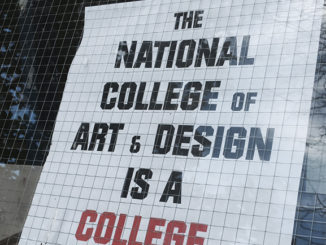
It’s half past seven on the first night of the Metropolis festival at the RDS and many people are sitting comfortably in the ornate Concert Hall, listening to legendary Dublin DJ Billy Scurry decry Ireland’s licensing laws. He says that despite the victorious marriage equality campaign, “we still have to be out of here by half twelve tonight – what’s that about?”
Scurry is onstage with Bodytonic founder Trevor O’Shea, journalist and producer Emer Nic Aodhain, DJ and journalist Mark Kavanagh and Rory O’Neill, Queen of Ireland and owner of Pantibar. They’ve been brought together for a conversation about Dublin’s club culture, under the banner of Dublin After Dark.
“What’s happened in Ireland up to now is, successive governments and agencies like the Gardai and other individuals like the right-wing press have all conspired to make it taboo to have a conversation about liberalising licensing laws,” their mediator on the night, Tonie Walsh tells me over the phone.
Tonie is a former DJ and promoter, and is now a historian, and alongside designers Niall Sweeney and Richard Seabrooke, he is part of the team behind the Dublin After Dark project, which aims to gather people’s stories about Dublin’s club culture in a book, “a collection of oral histories” as he puts it.
The Dublin After Dark project stands alongside other ventures such as DJ Aoife Nic Canna’s radio documentary series Folklore From The Dancefloor and Rabble magazine’s James Redmond’s film As An Talamh: Notes On Rave in Dublin as proof that people are starting to break the taboo and talk about club culture and the effect licensing laws have had on it. But Tonie says that club culture is still not getting the “respect, kudos and fulsome analysis it deserves.”
“Historically, the people we serve, who we open our clubs to… they’re passive consumers of the entertainment, but when it comes to action, trying to use their power as consumers to affect change, it rarely happens,” Tonie tells me, while also pointing to a conservative legislature “that would never set foot inside a bar or a club.”
Things are changing on that front though, Tonie says, pointing to the “most spectacular situation” of the Taoiseach’s appearance in Pantibar during the Marriage Equality campaign, while Minister for Health Leo Varadkar was recently spotted with friends in Mother. “When I started clubbing in 1976 it seemed like an oxymoron, the idea of a clubbing politician”, Tonie laughs.
Despite this new era of clubbing ministers, Ireland’s clubs still have the shortest operational times in Europe and the Government has failed to liberalise licensing laws – Alan Shatter’s Sale of Alcohol Bill was shelved when Frances Fitzgerald became Minister for Justice.
Sunil Sharpe is a DJ and the head of the Give Us The Night campaign, who have been rallying against the present laws since 2004. Was it frustrating for him to see the Government put the issue on the long finger again? “It wasn’t frustrating really as I am quite used to it and knew quite some time ago that it wasn’t on their agenda” he tells me by email.
“I think what is frustrating is the amount of divide in opinion on the whole subject of opening hours, and how alcohol plays such a central role in it. The bill is a hot potato that no party or politician really wants to touch. It is frustrating that the industry and our music scene is so heavily hampered by this issue” says Sharpe.
In September in a blog post on giveusthenight.com, Sharpe said that “it appears that the will of nightclub owners to lobby is at an all-time low”. Why does he think that is?
“I think the Irish Nightclub Industry Association have come up against a brick wall with the government too many times… In my opinion a very big part of the problem is the lack of drive in nightclub owners as a whole,” he says.
“We were the ones that made this an actual news story, we were the ones that campaigned outside the Dáil, but very very rarely have any nightclub owners stepped up and spoken out against the current legislation. I think many club owners are scared of the consequences should they speak out publicly.”
Stephen Keegan




Leave a Reply